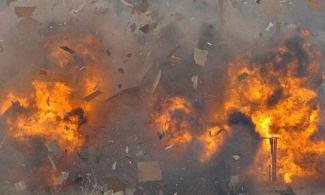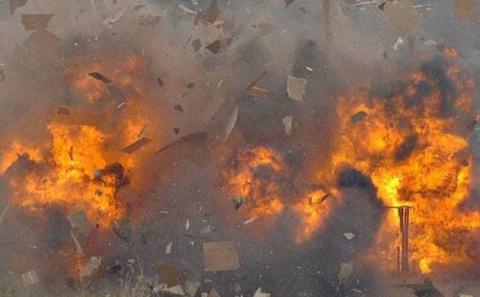
But as massive as Sunday’s explosion is, it is not a peculiar one – the tragedy merely adds to a long list of similar events that have haunted Lagos’ rich and poor residents over the years.

Lagos, Nigeria’s commercial capital, again recorded another deadly explosion on Sunday morning, leaving behind devastation and chaos in its wake for all those directly affected. The incident, which happened around the Abule Ado area of the city, was triggered by combustible items stocked inside a factory, which went up in flames. Over 50 buildings were affected in the community and other nearby neighbourhoods while at least 15 deaths have already been recorded. The entire place is currently on a lockdown as firefighters and emergency workers move around the site of the explosion to contain the disaster.
But as massive as Sunday’s explosion is, it is not a peculiar one – the tragedy merely adds to a long list of similar events that have haunted Lagos’ rich and poor residents over the years. With most parts of the city densely populated and houses closely crammed in neighbourhoods with poor and inaccessible road networks, attending to disasters such as explosion in Lagos has become a Herculean task for relevant government agencies.
For example, three persons were confirmed dead after a pipeline exploded at Eroko Road, Abule Egba, Lagos, on January 20, 2020. The explosion was said to have been caused by a vandalised NNPC pipeline in the community. [story_link align="left"]78823[/story_link]
Spokesperson for the Lagos State Emergency Management Authority, Nosa Okunbor, while confirming the incident at the time, said, “Two adult males and an infant lost their lives while 11 trucks laden with 40feet containers were destroyed and seven buildings razed down by the inferno.”
Before that time in September 2019, tragedy struck when a pipeline explosion razed 13 shops in the Idimu area of Lagos and left several persons battling life-threatening injuries.
A little over a year before that period, Lagos was brought on its knees when in June 2018 a petrol tanker, which exploded on the Otedola Bridge close to the Lagos-Ibadan Expressway, wreaked havoc on anything within sight. By the time the fury of the explosion simmered, over 12 persons laid dead while several others battled burn wounds. The tragedy also consumed more than 54 vehicles caught by the fire from the burning petrol tanker.
In June 2014, pipeline vandals breached oil installations belonging to the Nigerian National Petroleum Corporation at Ilado, a small island off the coast of Lagos, causing several deaths and destruction.
This was after a similar incident at the same location in December 2006 where a pipeline explosion killed hundreds of persons.
In May of that same year, at least 150 people were killed when another explosion caused by a pipeline breach rocked the same community.
Pockets of smaller explosions were recorded across the city after that period with destruction and deaths trailing such incidents.
However, the scariest of explosions so far witnessed in Lagos occurred on January 27, 2002 when the armoury inside the Ikeja Cantonment – in the heart of the city – went up in flames. The impact of the explosion was so much that it was felt across many parts of Lagos, damaging houses, cars and other valuables. Apart from at least 1,100 persons that were believed to have been killed, more than 20,000 others were rendered homeless and left with varying degree of injuries. That incident remains one of the most tragic in the history of Nigeria. A cenotaph at the foot of the Oke-Afa Bridge in Isolo, a suburb within the metropolis, serves as a sad reminder to that tragedy.
Town planning experts have called for communities to be designed in ways that leave room for easy evacuation and intervention by emergency workers in cases of disasters such as the Abule Ado incident. Sadly, the city of Lagos with all its ‘sophistication’, is not close to achieving that target. Like many Nigerian cities, it remains at the mercy of avoidable disasters that now threaten lives and property.